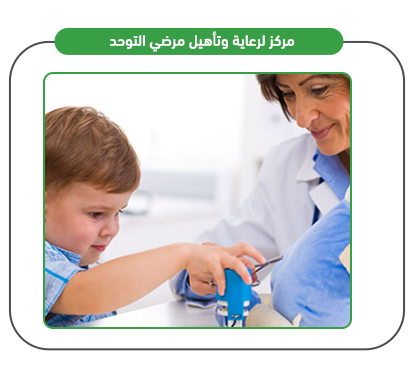It aims to establish a center to serve children with autism by providing a range of services, including early diagnosis, early detection, early intervention, and the provision of rehabilitation, educational, and therapeutic services for children with autism.

It is about establishing a center to serve children with autism disorder by providing a group of services represented by diagnosis, early detection, early intervention, providing rehabilitation, educational and therapeutic services for children with autism, rehabilitation services for people with severe disabilities, development and training services, family and community services, and providing training courses for families and parents of children with autism on mechanisms for dealing with this category, as well as implementing the rehabilitation and educational program at home, through academic specialists with international expertise from Arab countries, Europe, Australia and Canada, as well as national expertise. Thus, the center for the care and rehabilitation of autism patients will be an international center and a distinguished and unique edifice in the Middle East region, providing specialized services for children with autism disorder and severe disabilities through diagnosis, early intervention, treatment, care and rehabilitation, as autism rehabilitation center projects are considered important projects to serve the community.

Center Services<br>Diagnosis<br>Early Detection of Disability<br>Early Intervention<br>Rehabilitation, Educational, and Therapeutic Services for Children with Autism<br>Rehabilitation Services for People with Severe Disabilities<br>Center Training Services<br>Development and Training Services<br>Family and Community Services for Autism Prevention<br>Training Courses for Families and Parents of Children with Autism and Severe Disabilities on Mechanisms for Dealing with This Group<br>Training Courses on How to Implement Rehabilitation and Educational Programs at Home


Executive summary
Study project services/products
Market Size Analysis
Risk Assessment
Technical study
Financial study
Organizational and administrative study

The Healthcare Sector in the GCC
Mashroo3k Company presents some important indicators and keys for anyone interested in investing in this sector and its projects in the GCC:
The total number of hospitals in the GCC is 802, according to the latest statistics. The government sector accounts for 58.9% of the total number of hospitals, while the private sector accounts for 41.1%.
More than 61% of physicians are in the Kingdom of Saudi Arabia.
Compared to the rest of the GCC countries, the UAE recorded the highest percentage of physicians in the private sector, at 64%. Bahrain followed with 44.8%, and Qatar ranked third with 27.1%.
Compared to the rest of the GCC countries, Kuwait recorded the highest percentage of physicians in the public sector, at 79%, followed by the Sultanate of Oman with 74.6%, and then Saudi Arabia with 71.6%. In the Kingdom of Saudi Arabia, average annual spending on digital health infrastructure is expected to increase from $0.5 billion annually to $1.5 billion by 2030.
There are approximately 700 healthcare projects in various stages of development in the GCC region, valued at approximately $60.9 billion. These projects include hospitals, clinics, and research centers, with 264 projects valued at $24.7 billion under construction.
Over the years of Mashroo3k support to entrepreneurs and investors, it has developed a true belief in the importance of the healthcare sector and its pivotal role in economic growth and the advancement of nations. Based on this belief, Mashroo3k has decided to present some important indicators and keys for anyone interested in investing in this sector and its projects in the GCC:
Healthcare spending in the GCC is expected to reach $104.6 billion in 2022, up from just $76.1 billion in 2017. The average healthcare inflation rate in the GCC countries will decline to 4% in the coming years.
In light of the expected increase in patient numbers, the GCC countries require an estimated bed capacity of 118,295 beds.
Artificial intelligence (AI) is likely to represent 30% of hospital investments in the GCC from 2023 to the end of 2030.
The GCC pharmaceutical manufacturing market will grow to a value of $8-$10 billion.
The GCC consumables manufacturing market will flourish from 2025-$2030, and is expected to reach $30 billion in size.

According to United Nations reports, the world’s population will reach 8.5 billion in 2030, and by 2050, it is estimated to rise to 9.7 billion. This population increase will certainly be accompanied by an increase in demand for healthcare services. Therefore, your project recommends investing in this vital sector.
It is worth noting that global health spending is expected to rise at a rate of 3.9% annually between 2020 and 2024, a rate significantly higher than the 2.8% recorded between 2015 and 2019.
It is worth noting that the number of hospital beds worldwide per 1,000 people is 2.9, and the number of doctors per 1,000 people is 1.8. The number of nurses and midwives per 1,000 people is 4. These figures are far below what is required. Therefore, we hope to increase investments in the healthcare sector to meet the growing demand for healthcare services.
The Global Healthcare Sector: Technological advancements in the healthcare sector have played a significant role in improving medical services; survival rates and quality of life have improved significantly over the past decade. Experts expect the global medical services market to grow from USD 6,872.86 billion by the end of 2021 to USD 7,548.52 billion by the end of 2022. By 2026, the medical services market is expected to witness significant growth, reaching USD 10,414.36 billion, at a CAGR of 8.4% during the forecast period (2022-2026).